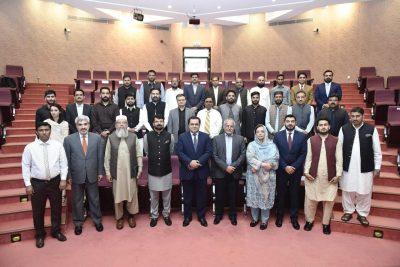
The Pakistan Institute for Parliamentary Services (PIPS) organized a three-day capacity-building workshop from 21st April, 2025 to 23rd April, 2025 for twenty-six officers of the National Assembly of Pakistan, focusing on the theme of “Hansard and Verbatim Reporting.” Held at the PIPS main campus Islamabad, the training was tailored to enhance the technical skills and institutional understanding of participants in the area of parliamentary reporting, editing practices and Hansard tradition; an essential function for preserving the transparency and integrity of legislative proceedings.
The session began with the recitation of verses from the Holy Quran, followed by welcoming remarks and a program overview delivered by Ms. Marium Ahsan, Deputy Director, PDP Wing, PIPS. She briefed participants on the objectives of the workshop, after which the officers introduced themselves and shared their expectations from the training. Many participants noted that the training was long overdue and appreciated the opportunity to improve their skills in Hansard and verbatim reporting.
The inaugural session was led by Mr. Zafarullah Khan, Parliamentary Expert, who provided a thought-provoking overview of the transformation of Hansard and verbatim reporting from traditional practices to more contemporary, technology-driven formats. He emphasized the cultural and historical importance of parliamentary reporting and the significant evolution it has undergone over time. This was followed by a highly engaging session with Mr. Syed Shamoon Hashmi, Special Secretary (Special Initiative), National Assembly of Pakistan, who spoke about the operational dynamics of parliamentary proceedings and the practical tools needed for precise and effective reporting. Drawing upon his institutional knowledge, he highlighted the critical role of accurate documentation in maintaining legislative transparency.
The second day of the workshop began with another session by Mr. Zafarullah Khan, focusing on the styles and traditions of capturing parliamentary proceedings. He covered fundamental aspects such as the checklist for Hansard reporting, basic principles and long-standing traditions, and addressed questions like whether members may edit draft transcripts. He also explored key concepts including slips of the tongue, voting patterns, and the extraction of ruling books from verbatim records. The session underlined the importance of contextual and institutional knowledge in producing a reliable Hansard.
In the following session, Mr. Muhammad Jawwad, Lecturer at Allama Iqbal Open University(AIOU), led an in-depth discussion on Hansard and verbatim indexing for research purposes. He explained the significance of indexing, how it facilitates research on legislative history, policy changes, and political discourse, and the advantages of quick retrieval of debates on specific topics. He discussed the structure and components of Hansard, challenges in navigation due to unstructured or lengthy texts, and tools designed for efficient indexing. Participants were then divided into three groups and each group was assigned a verbatim speech from the National Assembly. Their task was to convert the speech into the standard Hansard format, after which each group presented their work through their group leader.
The final session of the day was conducted by Mr. Javed Iqbal, Senior Director General (Retired), Senate of Pakistan. He led an interactive session on editing practices for Hansard and verbatim reports, where he shared examples from the Senate and highlighted best practices developed over his career. His insights emphasized the importance of editorial consistency and integrity in documentation.
The third day of the workshop opened with a session titled “Hansard/Verbatim in the Digital Age: Artificial Intelligence in Hansard/Verbatim Production,” again led by Mr. Zafarullah Khan. He discussed the potential of digital technologies, including artificial intelligence and simultaneous translation software, in streamlining parliamentary reporting. He also elaborated on the use of social media, hardware and software tools, and searchable digital formats to improve public access and institutional archiving of debates.
In a follow-up session, Mr. Zafarullah Khan spoke on “The Way Forward for Authentic Verbatim Reporting,” outlining critical reforms, resource requirements, and the importance of reviving the culture of indexing. He stressed the need to adapt to modern technologies while preserving the authenticity of parliamentary records.
The workshop concluded with the completion of evaluation forms by the participants. The closing ceremony was hosted by Mr. Fayaz Thaheem, Deputy Director, PDP. In her concluding remarks, Ms. Samer Awais, Director General (PDP & C), extended her sincere thanks to the participants for their dedication and enthusiastic participation throughout the training. She remarked that their commitment had made the entire workshop an enriching experience.
In the closing ceremony, Mr. Asim Khan Goraya, Executive Director of PIPS, emphasized the vital role of Hansard and verbatim reporting in strengthening parliamentary democracy and announced PIPS’s intent to develop a comprehensive manual in collaboration with the National Assembly. He also reaffirmed PIPS’s ongoing support for institutional capacity-building. The event concluded with the distribution of certificates to participants, presented by Mr. Asim Khan Goraya.